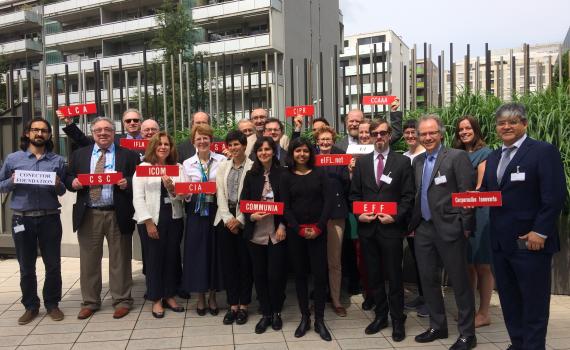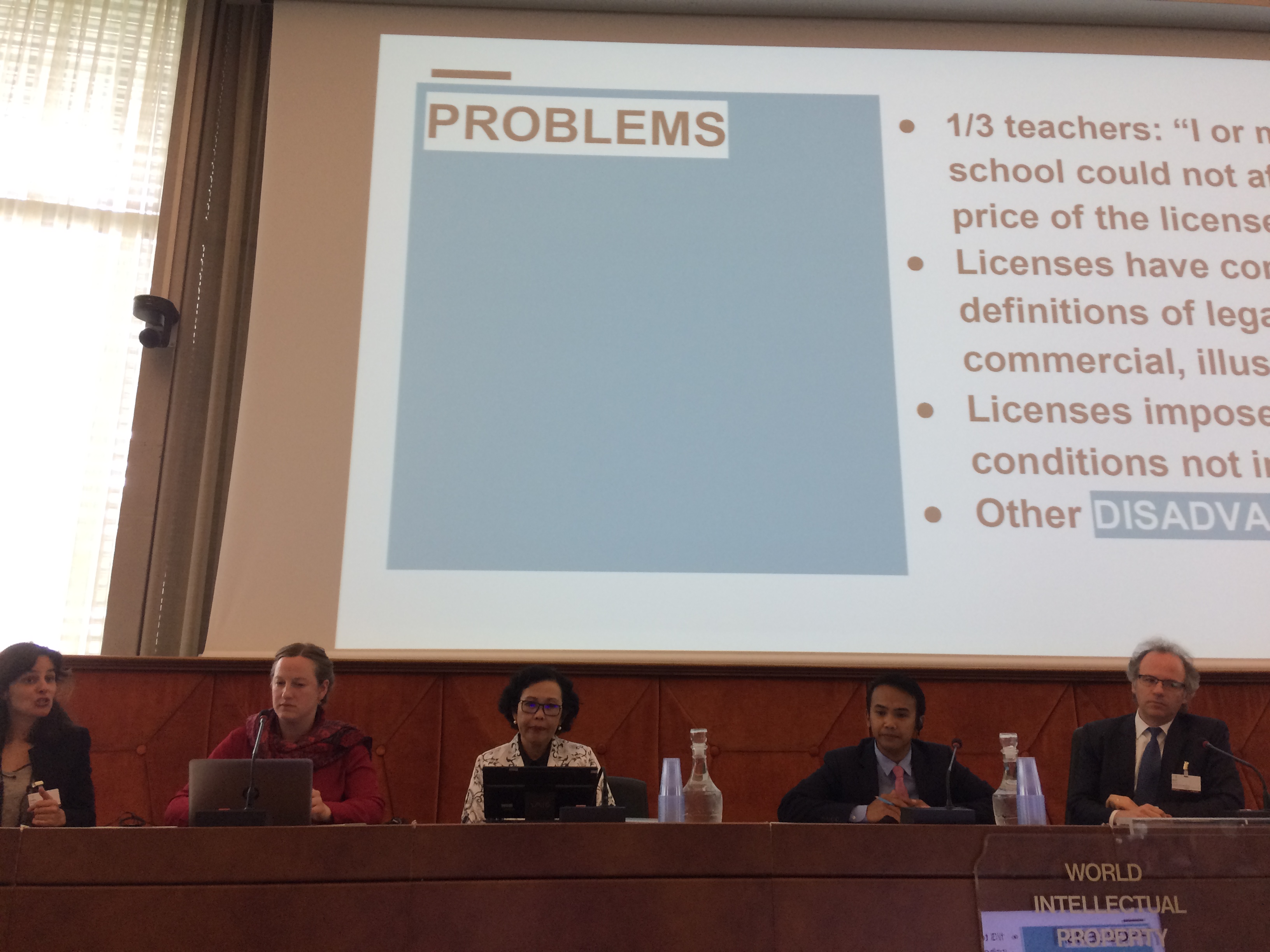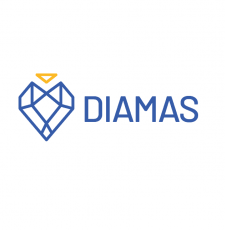
Teresa Hackett, EIFL Copyright and Libraries Programme Manager participated in the 36th meeting of the WIPO Standing Committee on Copyright and Related Rights (SCCR), the global body that sets international copyright law and policy, that took place from 28 May to 1 June 2018. During the busy week, EIFL engaged in discussions on libraries and archives, made interventions in plenary sessions, met with member state delegates and collaborated with NGO partners.
During SCCR/36, member states approved an action plan on libraries, archives, museums, and education, delegates heard about the ‘teachers’ dilemma’ for quality education, NGOs issued an open letter to negotiators on the proposed broadcast treaty, and the Secretariat held a consultation meeting on the WIPO Good Practice Toolkit for CMOs.
Action plan for libraries, archives and museums gets green light
For libraries, the main focus at SCCR/36 was to secure agreement on a draft action plan on limitations and exceptions for libraries and archives for the biennium 2018-2019. The goal of the plan is to support work on libraries and archives at SCCR.
EIFL welcomes the action plan (SCCR/36/7) adopted by member states after almost two days of negotiation. The plan, that builds on prior work of the Committee, features additional research and new activities with timelines for reporting back to SCCR. It intends to provide the Committee with suggestions for areas where international cooperation is needed.
We hope it will result in a deeper understanding of how libraries operate in the digital environment, especially across borders, and the international copyright framework that is needed to underpin the work.
New research outlined in the action plan includes developing a typology (or classification) on limitations and exceptions for libraries, archives and museums (we’re hoping it will be in the form of a searchable database), completing the scoping study on museums, and updating the Crews study on limitations and exceptions for libraries and archives to provide additional information on archives.
New activities are to undertake a brainstorming exercise to identify library areas that would benefit from further work at the international level, to conduct up to three regional seminars on libraries, archives and museums, and to hold a conference on libraries, archives and museums, as well as education. Regional seminars will provide a great opportunity to bring the debates outside Geneva to include more voices and experiences from librarians who otherwise wouldn’t have the chance to participate in international discussions.
For EIFL and our international partners from the library, archives and museum sectors, four elements were essential for any new action plan to succeed.
1. The plan should complement, not sidestep, the work of the Committee.
2. Libraries, archives and museums should be treated concurrently and together.
3. The plan should focus on non-commercial uses of copyright-protected material.
4. Activities should be organized in consultation with global beneficiary organizations from the library, archives and museum sector, and funding set aside for participation by beneficiaries.
We’re glad that the action plan as adopted largely reflects these concerns, in particular providing strong linkages to the prior work of the Committee and the intention to feedback suggestions on areas for international action.
EIFL and our partners at the International Federation of Library Associations and Institutions (IFLA), the International Council on Archives (ICA) and the International Council of Museums (ICOM) are ready to provide assistance so that the activities are productive and that the outcomes lead to real progress. We will also be on hand to ensure that the action plan remains fully on track.
Lunch-time discussion: How WIPO can contribute to achieving the Right to Education
Limitations and exceptions for education are also on the agenda at WIPO.
Erry Prasetyo, Indonesian Permanent Mission in Geneva chaired a lunch-time panel discussion, attended by more than 80 delegates, on how WIPO can contribute to achieving the Right to Education that was organized by Education International, the global federation of education unions, and the Indonesian Delegation to WIPO.
Unifah Rosyidi, Persatuan Guru Republik Indonesia Teachers’ Union, set out the challenge of the teachers’ dilemma in a developing country striving for quality education. “Without learning, we will be left behind. We are willing to learn, but we can’t afford the high prices of resources,” said Rosyidi. “The reality is that high prices lead to low participation by students, low prices lead to high participation, and no price of resources results in massive participation.”
Brianna Schofield from the Authors Alliance presented the findings from a survey of authors of works involved in the long-running Georgia State University (GSU) case (where publishers sued GSU for copyright infringement), and described how limitations and exceptions in an educational context can enhance authors’ incentives to create by furthering these authors’ goals to advance knowledge, build reputational capital, and increase the impact of their works.
Professor Michael Geist, University of Ottawa presented important data on the situation in Canada regarding access and spending on educational materials since the introduction in 2012 of a more flexible national approach to education limitations and exception. In his presentation, ‘Separating Fact from Fiction: The Reality of Canadian Copyright, Fair Dealing and Education’ Professor Geist reported three key findings from data analysis.
First, data shows that publisher licensing remains at the heart of access to electronic resources in Canada, along with fair dealing and open access to scholarly material. Second, spending on educational materials has increased, not decreased, since 2012. Third, publisher profit margins have also increased, including for Canadian publishers.
The conclusion: flexible exceptions and licences can, and do, co-exist in the information ecosystem.
Strong, robust liberally interpreted limitations and exceptions are part of the system. They do not end licensing or destroy publisher markets. In other words the best way to calibrate access is to adopt an integrated approach - not exceptions OR licensing but exceptions AND licensing.
However the approach in Europe seems to be licensing NOT exceptions, according to Teresa Nobre from Communia.
Europe is about to beef up its provision on education by making the exception mandatory in all European Union member states. But the current draft proposal for a Directive on Copyright in the Digital Single Market would allow licences that are available on the market to take precedence over the exception. In other words, the exception applies only if there is no licence is available.
Analysis by Teresa Nobre of 10 collective licence agreements in three countries (Finland, France, and the UK) revealed how educational licences for using copyrighted content in schools already include many terms and conditions that restrict users’ rights and that are unfair or unreasonable.
If the European proposal giving priority to licences is adopted, such instances of unfair or abusive licensing terms only look set to increase.
Open letter from NGOs on the proposed broadcast treaty
On the proposed treaty for the protection of broadcast organizations that is also on the agenda at SCCR, EIFL joined an open letter to member state delegates at SCCR/36 outlining key concerns that have not been adequately addressed in ongoing negotiations.
The civil society letter sets out eight areas of concern in the draft treaty text, including a ludicrously long term of protection (50 years) that in effect means a post-fixation right (providing broadcasters with rights to control uses of content recorded from a broadcast), weak limitations and exceptions, danger of overspill to works in the public domain or to works that are openly licensed, confusion on an ever-expanding definition of beneficiaries, confusion on expanding objects of protection.
The proposed treaty, that sets out to create a new related (or neighbouring) right to copyright to protect broadcast organizations against theft of their broadcast signal, has been under discussion for more than 20 years. While a lot of work remains to be done on fundamental issues such as the objectives, specific scope and object of protection, negotiations are slowly inching forward as more member states are expressing their support for adoption of a treaty.
While supportive of measures to address the legitimate concerns of broadcasters, the NGO letter stresses that any new treaty must be well-defined and should not impede access to works or create problems (for example, for libraries in using broadcast content).
Read EIFL’s interventions on the proposed broadcast treaty at SCCR/36 (2018), SCCR/35 (2017), SCCR/32 (2016) and SCCR/31 (2015). Thanks to EIFL librarians in Armenia, Botswana, Lithuania and Senegal for providing useful examples of diverse uses of broadcast content in different types of libraries for social, educational and public interest purposes.
WIPO Good Practice Toolkit for CMOs
During the week, EIFL also participated in a consultation meeting organized by WIPO to answer questions on the draft Good Practice Toolkit for Collective Management Organizations (CMOs) being developed by WIPO.
The Secretariat explained the purpose of the draft Toolkit, the process for consulting with member states and stakeholders, and summarized key points raised during the first consultation in March 2018. (EIFL’s comments are available here).
Following feedback from the consultation, the next version of the Toolkit will contain an executive summary with background and context, and it will state more prominently that the document is not in any way normative. There will be more information on areas such as repertoire, dispute resolution, policies on undistributed monies, the context of limitations and exceptions, and rights reversion. Statutory regulation, as well as self-regulation, will be highlighted equally.
There were many comments and considerable differences of opinion from respondents on the definitions and uses of Licensee and User (in its submission, EIFL requested clarification of the terms Licensee, User and public, and recommended expanding these sections of the document). All the comments will be taken into consideration for the next version.
In terms of process, a revised draft version of the Toolkit will be circulated by WIPO at the end of June 2018, written comments on the revised version can be submitted by the end of August and the final version is expected to be published in October 2018.
Find out more
- Video on demand SCCR/36. From the dropdown list, select Standing Committee on Copyright and Related Rights: Thirty-Sixth session
- Twitter hashtag #sccr36
- IFLA report on SCCR/36: Action for Libraries at the World Intellectual Property Organisation (SCCR/36)
- Background, EIFL Copyright and Libraries Programme - Why EIFL is advocating for an international treaty for libraries and archives.
SHARE / PRINT








